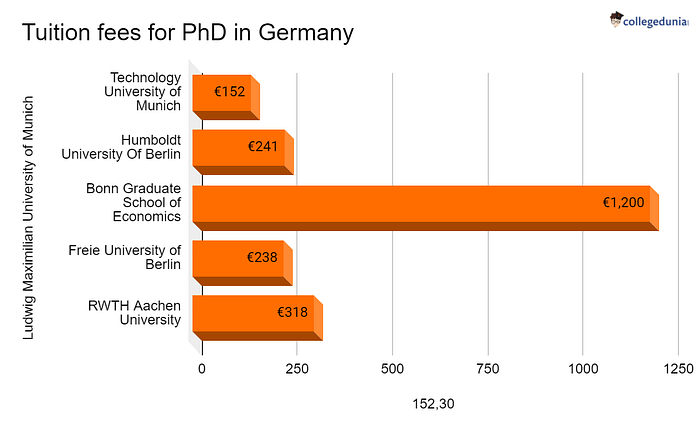PhD in Germany is offered for a period of 3-5 years in many fields of Humanities, Social Sciences, Biosciences, Natural Science and Economics. The minimum requirements for PhD in Germany are a master's and bachelor's degree with above average GPA (80%) from a recognized university. The programs are offered in mainly English but some also require German proficiency such as DSH-2, or the Goethe certificate C2 – Great German Language Diploma.
The top universities in Germany for PhD in Germany offer the program without tuition fees and others levy minimal semester ticket fees of around 250 EUR (22,000 INR). Graduates of PhD in Germany are employed at several companies with high salaries at an average of EUR 75,962 (INR 66,92,965). Some of the top companies employing PhD graduates in Germany are Mercedes Ben and Juniper.
PhD in Germany: Course Highlights
| Program | PhD |
| Program Type | Doctoral programme |
| Program Duration | 3-5 years |
| Eligibility Criteria | Master from a recognized university |
| English Proficiency Requirements | TOEFL 88-100, IELTS 6.5-7.0 |
| Tuition Fee Range | Semester Ticket Fees of around 250 EUR (22,000 INR) |
| Average Salary | 50,000 EUR- 110,000 EUR (44-97 Lakh INR) |
| Top Employers | Mercedes Benz, Uniper |
PhD in Germany: Top Universities
Many universities offer PhD programs in Germany. Many of these universities offer programs without tuition fees with various disciplines available. The applicants have to ensure that a vacancy slot is available for the particular subject before applying.
| University | Program | Deadlines | Total Tuition Fees (EUR ) |
|---|---|---|---|
| Ludwig Maximilian University of Munich | Medicine,Learning Sciences, Clinical Pharmacy, Oral Sciences, | 15 July 2023 | 152.30 |
| Technology University of Munich | Medical Life Science and Technology | 15 May 2023 | 152.30 |
| Humboldt University Of Berlin | Business studies, Theology | 15 February 2023 | 240.64 |
| Bonn Graduate school of economic | Doctoral Program (PhD) with integrated MSc Economic Research | 31 March 2023 | 1,200 |
| Freie University of Berlin | Humanities and social sciences | February 17, 2023 | 237.89 |
| RWTH Aachen University | Humanities, natural sciences | June 15, 2023 | 317.51 |
| University of Goettingen | Medicine, theology | January 15 | 300 |
| University of Freiburg | Humanities, Natural Sciences | Rolling Basis | 644 |
Why study PhD in Germany?
Germany is a top choice for aspiring students for PhD studies. Germany offers many options for the same and students can avail the benefits with a lesser spend of money. It is a good choice because of the following reasons:
- Germany offers good infrastructure and facilities for research in various disciplines.
- According to the German Federal Statistical Office, the number of international PhD students in Germany has been steadily increasing in recent years. The largest groups of international doctoral students were from China (8,367), India (6,466), and Iran (2,931).
- The fields of study with the highest number of international doctoral students were engineering (11,302), natural sciences (9,774), and medicine (6,417).
- Germany is known for its high-quality education system, and its universities are well-regarded globally. German universities have a long tradition of producing excellent research, and many Nobel laureates have come from German universities.
- The average salary of a PhD graduate in Germany is EUR 75,962 ( INR 66,92,965)
Explore: Part-time jobs in Germany
PhD in Germany: Specializations and Syllabus
Various disciplines are offered as Phd programs in German universities. These universities often offer the program for a period of 3-5 years.
PhD in Germany is offered either as an individual doctorate or a structured doctorate. Individual doctorate programs are offered for 3-5 years and this has to be completed individually under the supervision of a professor. In structured doctorate programs, a group of supervisors mentor a group of students in particular subjects. Some also offer integrated programs with Master's and PhD programs.
PhD programs in Germany are offered in various disciplines. The most common subjects are computer science, economics, Business, Science and Mathematics. Several programs are available in a broad range of subjects like Humanities, social science, natural science, bioscience, and economics.
PhD in Germany: Admissions
Admission to colleges for PhD programs in Germany is based on their previous academic qualifications. Most of them do not require GRE/GMAT scores. The applicants have to submit all the required documents. Some of them require the documents to be sent through the mail.
PhD in Germany: Eligibility Criteria
Admission to PhD in Germany requires applicants to submit all the required documents within the time frame. Before submitting the application, the students have to first find a supervisor to guide them. After this, they can submit the application for PhD approval.
- Academic Degree- Master's degree from a recognized university
- Minimum GPA- average score
- GRE Score- A minimum GRE score of 160 is required.
- English Proficiency Test Score- TOEFL 88-100, IELTS 6.5-7.0
- Statement of Purpose(SOP)- A one page essay showing your interest in the university you are applying to and your future plans in the field.
- Letters of Recommendation(LOR)- 2 LORs are required to be submitted
Explore: Exams to study in Germany
PhD in Germany: Admission Requirements
The admission requirements for different universities offering PhD in Germany are listed below. Since some universities offer the program in German, a German proficiency proof might be required for application.
| University | Academic Requirement | TOEFL Score | IELTS | Additional Documents (Work Experience, Resume, essay, SOP and LOR) |
|---|---|---|---|---|
| Ludwig Maximilian University of Munich | An above-average university Master's degree | 79 | 6.5 | Transcripts, Proof of internships/ work experience, Letter of motivation, 1 LOR , CV, Research Proposal |
| Technical University of Munich | MSc or equivalent degree in medicine, biology, engineering, psychology, medicine, or a related subject | 88 | 6.5 | Academic transcripts, Personal data, Letter of Motivation |
| Humboldt University Of Berlin | Degree equivalent to the university degree | NA | NA | German Language Placement Test: 61, Academic transcripts, Written Letter of commitment , Copy of supervision agreement, CV |
| Bonn graduate school of economics | Bachelor's or Master's degree in economics or a related discipline | 100 | 7.0 | GRE 160, Academic transcripts , CV, 2 LOR, Letter of motivation |
| Freie University of Berlin | A recognized German university degree or equivalent | 100 | 6.5 | SOP, LOR, Academic transcripts, Certificate of university study eligibility, A valid form of identification |
| RWTH Aachen University | Masters degree in a recognized institute or equivalent with excellent GPA | NA | NA | German Language Proficiency, Academic transcripts and translations, Confirmation of supervision, Admission letter to doctoral studies, CV |
| University of Goettingen | Masters degree with minimum GPA of 2.5 | NA | NA | German Language Proficiency, Academic transcripts, Proof of German proficiency |
| University of Freiburg | Masters from a recognized institute | NA | NA | Transcripts, CV, SOP, LOR |
PhD in Germany: Cost of study
Most of the universities offering PhD programs in Germany offer them free of cost. Only a minimal amount is asked as a combined fee of semester ticket and social contribution fees. Thus, students only have to worry about the cost of living. The average cost for studies thus totals to EUR 1021.88 (INR 90887.56). Many universities also offer funding and scholarships for different programs.
PhD in Germany: Tuition Fees
Most of the PhD programs in Germany are offered free of cost. A minimal fee is required as semester fees. This averages to EUR 222.88 ( INR 19823.29).

| University | Total Tuition Fees (EUR) | Fee for Indian Students (INR) |
|---|---|---|
| Ludwig Maximilian University of Munich | 152.30 | 13,557 |
| Technology University of Munich | 152.30 | 13,557 |
| Humboldt University Of Berlin | 240.64 | 21,420 |
| Bonn Graduate School of Economics | 1,200 | 1.06 Lakh |
| Freie University of Berlin | 237.89 | 21,175 |
| RWTH Aachen University | 317.51 | 28,263 |
| University of Goettingen | 300 | 26,704 |
| University of Freiburg | 644 | 57,326 |
Explore: Germany study Visa
Cost of living in Germany
The average cost of living in Germany is around EUR 850 (~74,000 INR) per month or EUR 10,236 (~8.9 lakh INR) per year. The following is the breakdown of expenses you may incur in Germany as an international student.
| Expense Type | Average Monthly Expense (EUR) | Cost for Indian Students (INR) |
|---|---|---|
| Accommodation | 325 | 28,700 |
| Meals | 154 | 13,600 |
| Transportation | 116 | 10,200 |
| Health Insurance | 96 | 8,400 |
| Personal Expenses | 65 | 5,700 |
| Telephone | 24 | 2,100 |

Phd in Germany: Scholarships
Scholarships and grants are offered by universities, and private and public institutions. This is offered such that they cover the required PhD expenses.
| Scholarship | Awarded by (private/government/university) | Eligibility | Award Value |
|---|---|---|---|
| Study grants from foundation funds of the LMU Munich | Ludwig Maximilian University of Munich | Worth and needy students | Varies |
| The Marianne-Plehn-Program to support doctoral candidates in Bavaria | Studienstiftung | Doctoral applicants of a Bavarian University | Not mentioned |
| Elsa-Neumann-Scholarships | Free University of Berlin | Doctoral students who showcased excellent performance in an undergraduate degree | EUR 1,350 |
| BGSE grants | Bonn Graduate school of economics | Doctoral students showing exceptional performance | EUR 1,300 |
| Advanced Research Opportunities Program (AROP) | RWTH Aachen University | Doctoral candidates of international universities interested in partnering with RWTH Aachen university | EUR 1,000 |
| Education Fund | RWTH Aachen University | Doctoral students of the university | EUR 300 |
| Research Grants | DAAD | Doctoral candidates or students in German Universities | EUR 1,200 ( and other allowances) |
PhD in Germany: Jobs and Placement opportunities
After PhD in Germany, graduates are hired by many top companies. They can also be hired as an academician. But as a matter of fact, joining industries offers better prospects than in the academic industry.

| Profession | Average Salary (EUR ) | Salary for Indian Student (INR) |
|---|---|---|
| Academics | 51,000 | 44.93 Lakh |
| Engineer | 61,000 | 53.74 Lakh |
| Research scientist | 59,846 | 52.72 Lakh |
| Economist | 46,255 | 41.17 Lakh |
| Postdoctoral Research Associate | 50,964 | 45.36 Lakh |
Explore: Jobs for International Students in Germany
PhD in Germany: Return on Investment
Since most of the PhD programs in Germany are offered without levying tuition fees, the cost-benefit ratio is quite profitable. Also, most graduates are offered high-paying salaries.
| University | Total Tuition Fee (EUR ) | Average Graduate Salary Per Year (EUR ) |
|---|---|---|
| Ludwig Maximilian University of Munich | 15.230 | 86,000 |
| Technology University of Munich | 152.30 | 126,000 |
| Humboldt University Of Berlin | 240.64 | 69,000 |
| Bonn Graduate School of Economics | 330 | 96,000 |
| Freie University of Berlin | 237.89 | 78,000 |
| RWTH Aachen University | 317.51 | 51,600 |
| University of Goettingen | 300 | 127,000 |
| University of Freiburg | 644 | 179,000 |
PhD in Germany: Degree Comparison
The following tables show a basic difference between PhD in Germany and PhD in Canada on the basis of average tuition fees, cost of living, average annual salary earned, English proficiency requirement among other parameters.
| Parameter | PhD in Germany | PhD in Canada |
|---|---|---|
| Duration | 3-5 years | 4-6 years |
| Average tuition fees | Free of Cost Minimal semester ticket fees of around 250 EUR (22,000 INR) | 7,000 CAD- 20,000 CAD (4-12 Lakh INR) |
| Cost of living (per month) | 850 EUR (75,633 INR) | 1430 CAD (86,277 INR) |
| Visa | Schengen Visa | Study permit |
| Average Salary | 50,000 EUR- 110,000 EUR (44-97 Lakh INR) | 80,000 CAD- 120,000 CAD (48-72 Lakh INR) |
| Top Specializations | Business, computer science | Business, engineering |
| English language proficiency tests | IELTS: 6.5 or above TOEFL: 100+ | IELTS: 6.5 or above TOEFL: 90+ |
PhD is offered in many Universities in Germany. These are often offered free of cost and for a duration of 3-5 years. There are various sources of funding available for PhD students in Germany, including scholarships, research grants, and employment contracts as research assistants. Germany is a great choice for PhD studies as many opportunities are offered after graduation at high-paying salaries. Completing a PhD in Germany can open up many career opportunities in academia, research, and industry both in Germany and internationally. It can also provide valuable skills and experience in critical thinking, research methodology, and project management.
Explore: Post Study Work Permit in Germany for Indian students
FAQs
Ques. Is the PhD program free in Germany?
Ans. Most of the PhD programs in Germany are offered free of cost. Support for the PhD programs is also provided by the universities and various private and public funding institutes. Thus students only have to bear the cost of living for completing PhD programs in Germany.
Ques. Do PhD students get paid in Germany?
Ans.Many universities provide stipends and grants for PhD students. They are also provided associated jobs while pursuing their research to support their work
Ques.Is it easy to get a PhD in Germany?
Ans.Getting enrolled for PhD studies could be difficult for many students. Students have to find the appropriate colleges and find a supervisor who is ready to undertake them before filing the application.
Ques.How many years is a PhD in Germany?
Ans.Though typically most PhD programs are listed for a period of 5 years, it can extend to more years based on the time taken for completing the project and studies. Thus, the total number of years can vary according to students, universities as well as the supervisor guiding the students.
Ques.Do I need a GRE for PhD in Germany?
Ans.Most universities do not make it necessary to attend a GRE before application to PhD programs in Germany. To ensure this, students have to go through the application requirements of the specific program of all universities.


![Humboldt University of Berlin [Hu-Berlin]](https://static.zollege.in/public/college_data/images/studyabroad/logos/college_632_29-15:02_6.png?tr=w-50,h-50,c-force?tr=h-40,w-35,c-force)
![Technical University Munich [Tum]](https://static.zollege.in/public/college_data/images/studyabroad/logos/college_691_02-13:08_691.png?tr=w-50,h-50,c-force?tr=h-40,w-35,c-force)
![Ludwig Maximilian University of Munich [Lmu]](https://static.zollege.in/public/college_data/images/studyabroad/logos/college_690_02-13:05_690.png?tr=w-50,h-50,c-force?tr=h-40,w-35,c-force)
![Free University of Berlin [Fu Berlin]](https://static.zollege.in/public/college_data/images/studyabroad/logos/college_631_29-15:01_5.png?tr=w-50,h-50,c-force?tr=h-40,w-35,c-force)












